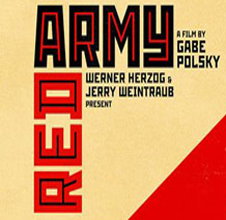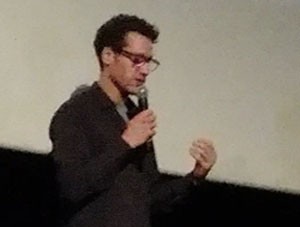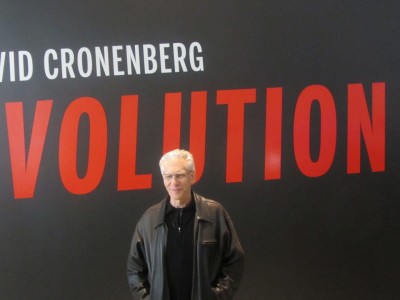Originally printed in Sydney’s Buzz on October 2, 2014 (with different pictures)
by shael stolberg
Sony Pictures Classics is now in the Oscar race for best documentary with the film “Red Army”. Director Gabe Polsky’s documentary is an engaging, human story about how the best hockey team in the world during the 70s – 80s and perhaps ever, came into being; the costs for the individuals involved as well as the societal changes and effects their successes and failures had on the former USSR as well as the world. In essence, this film is all about hockey and nothing to do with hockey.
Moreover, in this film Polsky weaves together all types of archival footage and current interviews that tell a story not only of a hockey team and program but of the socio-economic and political pressures that existed from the late 1950s up until the 1990s and the Glasnost age. We see the strength of Communism whither as all the main players in the team that during the Olympics in Sarajevo in 1984 won with a goal differential of 42-5 and also were undefeated after the Lake Placid Olympics for two full years either leave to play in the West or retire.
The archival footage goes all the way back to Stalin and includes their training methods, interviews with not only members of the Red Army team but a KGB agent assigned to “take care” of the players when they were out of the country and Viacheslav ‘Slava’ Fetisov’s wife. Since Stalin had linked success in sports to the identity of the USSR and used it as propaganda for the state, he made sure the athletes were the best in the entire country. They started training as young as five or six years old. It was seen as the duty of everyone to do his best and win for “Mother Russia”. To that end, it does not seem as surprising that the players did everything together. They spent 11 out of 12 months of the year living together rather than living with their families or spouse, and they were part of the country’s army as hockey players.
The first interview of the film is with Viacheslav “Slava” Fetisov who has been awarded the Order of the Red Banner of Labour, two Orders of the Badge of Honor, the very prestigious Order of Lenin as well as being inducted into the Hockey Hall Of Fame. He has two Olympic gold medals and seven World Championship gold medals. This interview starts with “Slava”, as everyone refers to him, starting to answer Polsky’ first question. However he stops almost immediately to take a call on his cell. At this point, the director could have stopped filming and started again once his subject was off the phone, but instead he keeps filming Fetisov as he is talking on his cell succeeds in grabbing the viewer’s attention. Seeing this man engaged in a private conservation with all his reactions could have been a risky move by the director who has said that he was only promised “15 minutes” of ‘Slava’s’ time. However, those 15 minutes grew into “five to six hours” states Polsky. This interviewing technique is used throughout the film and thereby we are able to witness this stoic man’s greatest victories as well as some of his most painful moments with humour and grace.
Polsky presents the relationship between ‘Slava’ Fetisov and Alexei Kasatonov a defenceman on the Red Army team very effectively. As mentioned earlier, the Red Army teammates were almost inseparable living 11 of the 12 months of the year together and this closeness would show on the ice but for ‘Slava’ and Alexi it was much more. ‘Slava’ admits they did everything together and were as close as brothers, so when we see Polsky ask Alexi about the riff between them he is choked up, even though, it happened over 20 year ago and we see the pain in his face as we do with ‘Slava’ when the same question is asked of him.
We are also shown the contrast in style between the two Red Army coaches of that time period, Viktor Tikhonov and Anatoli Tarasov. Viktor Tikhonov was more of a politician or administrator whose style was more authoritarian and dictatorial. He would actually hit or humiliate the players during practices or in game situations. Many of the players admitted to hating and not respecting him including Fetisov but could not really do anything about it. He was appointed by the government so that was that. Tikhonov also inherited the best hockey team in the world at that time and believed it was due to him later on.
Now, the architect of the Red Army hockey team and thereby its successes, Anatoli Tarasov had the players train with the Bolshoi Ballet as well as with the Soviet Chess team. We are treated to some archival footage of some of his eccentric training methods to keep the players in shape and have them function in harmony on the ice as a focused unit. He was also seen as a father figure by many of the players including Fetisov which is proven to great effect later on in the film when Fetisov stays with him once he leaves the team. Hockey to Tarasov was an art or a chess game not the “bump and grind” style of hockey you would see in North America.
It is interesting to note that when interviewing Polsky about this film I found out he played hockey for his alma mater Yale and saw it as his creative outlet. Polsky realized that once he gave up hockey, he needed another way to express his creativity and hence found writing and filmmaking. Polsky sees himself as a storyteller whose job it is “to engage the audience” either on the ice or making a film. It’s his job to show the audience “some magic”.
“Red Army” had its World Premiere at the Cannes Film Festival, its U.S. Premiere at the Telluride Film Festival and its Canadian Premiere at the Toronto International Film Festival (TIFF). International territories are being handled by The Wild Bunch but North American audiences will be able to see the directorial debut (he co-directed “Motel Life” with his brother Alan) of a filmmaker who wants to “engage the audience” and make “some magic” in January 2015 via Sony Pictures Classics in the U.S. and Mongrel Media in Canada. At that point, you will see a film about the changing times in hockey and the world created with nuance, subtlety and humour. Enjoy!




